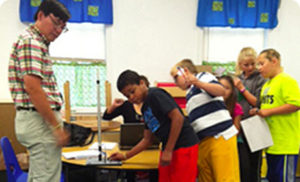
Students wait to test the effectiveness of their straw rocket design as measured by the distance traveled once launched. Students conducted distance trials then altered their design by decreasing weight to see if that increased or decreased distance traveled.
A group of young students from the Pokagon Band of Potawatomi Indians learned about energy conservation from U-M Professor Mark Moldwin this summer by running 60 meters to a make-believe grocery store, picking up one item, and running back. They did this three times. Another group ran to the store one time, picked up three items and ran back. A discussion followed about which group used the most energy, and other ways to conserve energy.
They were part of a larger group participating in the Dreamcatchers Summer Enrichment Program, an annual month-long program each July for Native American students to enhance their educational experience through tribal history and promote awareness to others in the surrounding community.
The 5 – 7th graders had a lesson in designing and testing the efficiency of a rocket made out of soda straws.
Professor Moldwin also taught a group of 8 – 10th graders to study sunlight as a form of energy using spectroscopes and prisms, and making UV detectors. Other “optics” experiments proved that working in career fields of science, technology, engineering and mathematics (STEM) can be fun.
Dana Sitzler, Associate Director of State Outreach, facilitated a meeting between Professor Moldwin, a Professor of Space Sciences and Applied Physics within the University of Michigan’s Department of Atmospheric, Oceanic and Space Sciences within the College of Engineering, and Samuel J. Morseau, Director of Education, Pokagon Band of Potawatomi Indians, that created the collaboration.
The Dreamcatcher program is based on Tribal Sovereignty curriculum being developed by the Pokagon Band of Potawatomi Indians as well as supplemental curriculum created by Chi Ishobak, the Four Winds Casino Resort, and local higher education organizations that involve principles of experiential learning which allow students to explore career fields in science, technology, engineering, and mathematics. The foundation of the curriculum includes four main topics, which are Reclaiming Our Identity, Rethinking History, Self-Determination, and Moving Forward.
Author: Dana Sitzler
Associate Director of State Outreach | [email protected] | 734-764-8029

